To watch more of our videos, including event clips, subscribe to our YouTube channel.
In early February, the U.S. Department of Defense issued its 2018 Nuclear Posture Review (NPR), the Pentagon’s statement of U.S. nuclear policy and capabilities. The report, mandated by Congress, was last issued during the Obama administration in 2010.
On Monday, February 12, the Foreign Policy program at Brookings hosted a conversation about the 2018 NPR featuring remarks by and Q&A with Deputy Undersecretary of Defense for Policy David Trachtenberg. A panel discussion followed that included Jim Miller, undersecretary of defense for policy in the Obama administration; Madelyn Creedon, principal deputy administrator, National Nuclear Security Administration during the Obama administration; James Acton, co-director of the Nuclear Policy Program at the Carnegie Endowment; and Robert Einhorn of Brookings. Brookings Senior Fellow Michael O’Hanlon moderated the discussion, while adding his own perspective.
2018 NPR ADDRESSES NEW REALITIES
In his remarks, Secretary Trachtenberg explained the NPR’s overarching goals: “deterring nuclear and nonnuclear attack; assuring allies and partners; achieving U.S. objectives should deterrence fail, and hedging against an uncertain future.” The review, he added, “also emphasizes that U.S. nuclear policy will continue to contribute to U.S. nuclear nonproliferation goals.”
A key point the deputy undersecretary made is that “the 2018 NPR addresses the reality that while the cold war has been over for decades, a much more challenging nuclear threat environment has developed since the previous 2010 Nuclear Posture Issue,” specifically with respect to the actions of Russia, China, North Korea, and Iran. Watch:
Secretary Trachtenberg observed that “in contrast to these developments in the past decade, the United States has built no new types of nuclear weapons or delivery systems other than the F-35 [Joint Strike Fighter] for the past two decades. We have instead sustained our nuclear deterrent with life-extension programs, keeping systems and platforms beyond, decades beyond, their designed service life.“ He added an observation made by former Defense Secretary Ash Carter, that “if there’s an arms race under way, the United States clearly is not a participant.”
In addition to noting the continued development of nuclear weapons capabilities by potential U.S. adversaries, Secretary Trachtenberg also stated that the 2018 NPR emphasizes the deterrence capabilities of the U.S. nuclear posture. The NPR, he said, “seeks to clarify U.S. policies to help remove the potential for mistaken calculation by potential adversaries that limited nuclear first use threats or escalation can provide them with any possible useful military advantage. Correcting the potential for such calculations is now a key to maintaining the deterrence of nuclear war.” A key recommendation in the NPR to achieve deterrence capability is attention to two “supplemental capabilities”—the modification of some existing submarine-launched ballistic missiles (SLBM), and “pursuit of a nuclear sea-launched cruise missile” (SLCM). Watch:
“Much as we might prefer otherwise,” Secretary Trachtenberg concluded, “U.S. nuclear weapons are the bedrock of American and allied security.” The goal of the 2018 NPR, he said, “is to deter war, not to fight one.”
During a Q&A period with the audience, Secretary Trachtenberg addressed a concern that the 2018 NPR suggests that the U.S. might retaliate to certain kinds of non-nuclear attacks with a limited nuclear strike. “There is nothing in the nuclear posture review that assumes an automatic nuclear response to any particular contingency,” the secretary said. Watch:
CONTINUITY AND DISCONTINUITY WITH OBAMA’S NPR
The panel discussion that followed featured analysis and insights on a wide range of topics related to the 2018 NPR. These included; China’s and Russia’s nuclear behaviors compared; the SLBM and SLCM concepts; nuclear command and control; cost; and continuity or change from the 2010 NPR.
All of the panelists spoke to the latter theme. Some commentators on the 2018 NPR have looked at it through the lens of it being the product of the Trump administration (n.b., it is the product of the Defense Department, and signed by the secretary of defense) and the degree to which it represents continuity or change with the 2010 NPR, crafted during the Obama administration.
Jim Miller, undersecretary of defense for policy in the Obama administration and now a senior fellow at Harvard’s Belfer Center, described a “very strong thread of continuity, both with respect to the policy and with respect to the programs,” between the 2018 and the 2010 NPRs. Watch:
An important question, Miller noted, is that while “there’s no question” that the 2010 review was President Obama’s own, “does this 2018 Nuclear Posture Review signed by [Defense] Secretary Mattis … represent the views of President Trump?” Panel moderator Michael O’Hanlon observed that the 2018 NPR attributes any discontinuity with the 2010 review to geostrategic changes that have occurred over the past 8 years, including Russia’s aggressive behavior, rather than to differences between the two presidents. Miller agreed that “the world situation has changed substantively relative to 2010 when the Obama administration’s Nuclear Posture Review was done.”
Robert Einhorn, former U.S. Department of State special advisor for nonproliferation and arms control, offered an important perspective on the continuity and change question, noting that the new NPR’s definition of “extreme circumstances” would broaden the contingencies in which the United States might use nuclear weapons. “The Trump administration may believe,” he said, “that declaring a readiness to use nuclear weapons in a wider range of circumstances will enhance deterrence, but I think such a declaratory position has some significant downsides. If an adversary believes that the United States will use nuclear weapons early in a conflict it may calculate that it’s better off using nuclear weapons first.” Watch:
“I think [the Trump administration] believes that ambiguity enhances deterrence,” Einhorn said, “but I think ambiguity can be confusing and it could lead some U.S. adversaries to jump to the wrong conclusion that the U.S. is prepared to initiate nuclear use early in a conventional conflict.
In her response to the question of continuity and change, Madelyn Creedon, principal deputy administrator of the National Nuclear Security Administration (NNSA) during the Obama administration, emphasized both NNSA infrastructure updates as well as modernization of the specific warheads on SLBMs and the air-launched cruise missile system. Watch:
Creedon added that in her view the new NPR’s “more aggressive approach to the NNSA architecture” is not merely to maintain the U.S. nuclear capability, but is “laying the foundation for a much larger arsenal down the road.”
Finally, on the theme of continuity and change between the 2018 NPR and the 2010 NPR, James Acton, co-director of the Nuclear Policy Program at the Carnegie Endowment, argued that the new NPR represents “more change than continuity,” with emphasis on the change in declaratory policy. “The United States,” Acton said, “is now threatening to use nuclear weapons in response to attacks that almost would certainly not kill a single human being.“ Watch:
While not discounting “the read security threat from Russia,” especially in regions such as the Baltics, Acton emphasized that “our fundamental response to that is much more effective in the nonnuclear domain than in the nuclear domain.”
O’Hanlon, who once worked at the Congressional Budget Office, shared his views on the costs associated with nuclear modernization articulated in the 2018 NPR. “I’m not persuaded by the math that I see in the NPR,” he said, “and we need to prioritize among five areas of modernization that he identified in the document. WATCH
Watch the full event and download a transcript of the event here.
The Brookings Institution is committed to quality, independence, and impact.
We are supported by a diverse array of funders. In line with our values and policies, each Brookings publication represents the sole views of its author(s).
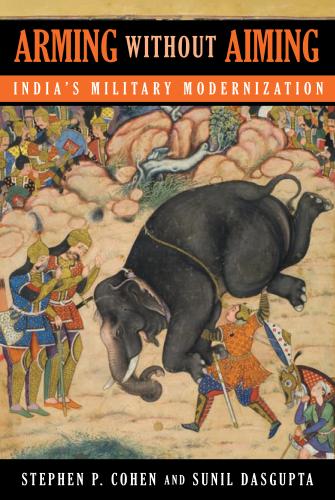
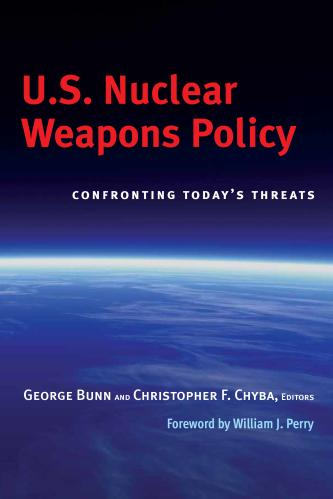
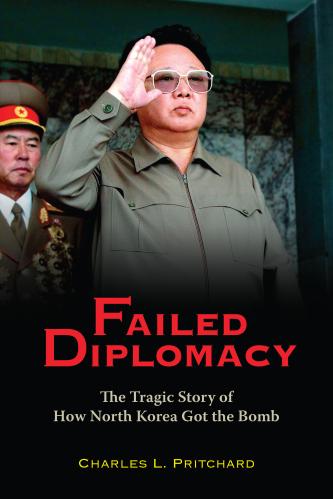

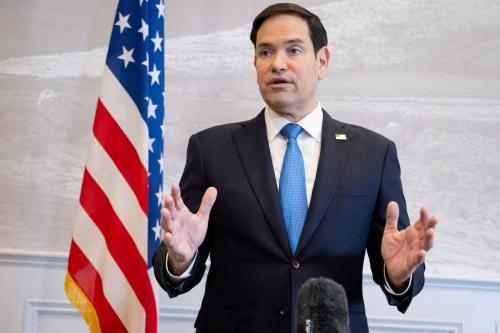

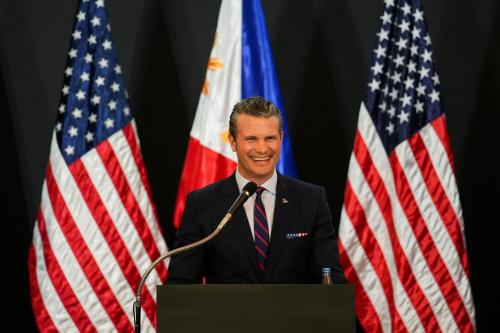
Commentary
WATCH: 2018 Nuclear Posture Review tailored to 21st century threats
February 16, 2018